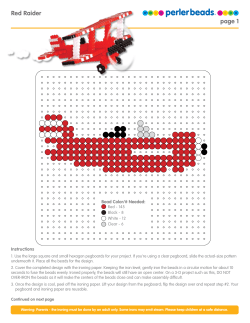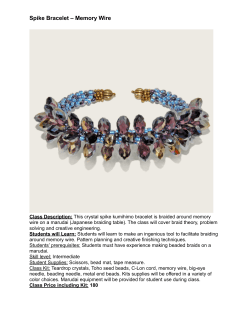
Make Your Own Fly Fishing Lanyard By Tim Rolston Revised April 2010
Make Your Own Fly Fishing Lanyard By Tim Rolston Revised April 2010 Smashwords Edition ****~~~~~**** Copyright Tim Rolston License Notes: This free ebook may be copied, distributed, reposted, reprinted and shared, provided it appears in its entirety, without alteration, and the reader is not charged to access it. Other titles available by this author on Smashwords Learn to.Fly-Cast in a Weekend.Excerpts. Sponsored by Inkwazi Fly Fishing Safaris. Lanyards offer a great alternative to having dozens of zingers about your vest, they make for easy access to essential items and so long as you remember to take them with you all of your gadgets are in one place. (Mind you it doesn’t help if you forget the thing at home or in the car). Essentially the lanyard is designed to keep the various items, floatant, nippers, hook sharpener etc separate and hanging comfortably around your neck. What do you need? Six snap swivels obtainable from even the most basic fishing tackle shop, but generally not a fly shop. A selection of beads, wooden, ceramic or even bone beads are good, glass beads are prone to break if dropped but really it doesn’t matter. You will require some longer beads to increase the distances between the snap swivels or use more round beads to get the spacing that you want. Requirements: You can play around as much as you like but the design here uses: six snap swivels, 12 spherical beads, Five long oblong beads and a length of cord. Prussik cord or leather from a bead shop is fine. You can also add snaps at the ends but we usually just use sliding knots, in fact the same double uni knot that you use to build a leader.. It is simplicity itself. Layout plan. Once you have selected the beads that you want lay them out in the pattern that you would like. You can use lettered beads to spell your name or any other combination of bright, camo, wooden or artistic bead combinations. Having a spherical bead on either side of the snaps helps stop them jamming against the ends of fine elongated beads but as said you can design it anyway you like. Thread the beads and alternate snap swivels onto the cord. You can use a darning needle or simply use your fingers. Insure that the cord is plenty long enough to fit over your head and then tie the ends together using a double uni knot. This knot allows you to slip the ends away from each other and shorten the lanyard around your neck but still to loosen it again to take it off at the end of the day. Knotting the ends together. To perform the double uni knot. Step one: Lay the two ends next to each other and form a loop in the one end. Step Two: Whip finish by taking the tag end around and around both itself and the other end of the cord. Four or five wraps will be plenty. Pull tight insuring that the loops don’t snag. The knot should slide freely up and down the standing line which will now be in the middle of the wraps. Step three: Repeat the process with the other tag end, I find it much easier to turn the entire lot around than to tie the knot backhanded. Step four: Pull the knots together and insure that they both slide. Step five: Pull the knots away from each other again to get the correct distance to suit you. Then trim off the waste ends. Attaching your gizmos. Now it is a simple case of attaching the various items that you want onto the snap swivels and closing them securely and you are ready to go fishing. You will either love your lanyard or hate it, personally I find it the most functional piece of gear and I love that I don’t have to fish into my vest pockets all the time when I am tying on a new fly, sharpening and treating it.. all much simpler and quicker. I hope that this little piece of advice will prove useful to you and that it will contribute to your enjoyment an efficacy on stream.. If you found this of value you can locate more useful fly fishing information on our blog at http://paracaddis.wordpress.com Tim Rolston Inkwazi Fly Fishing Safaris Cape Town.. www.inkwaziflyfishing.co.za
© Copyright 2025





















